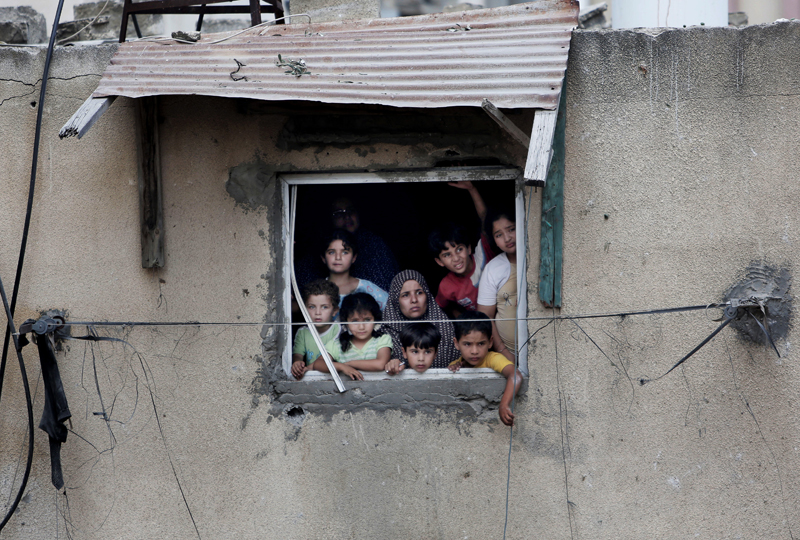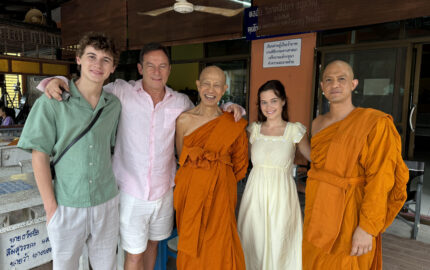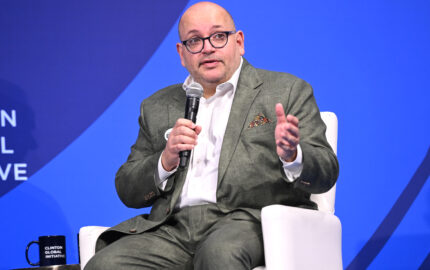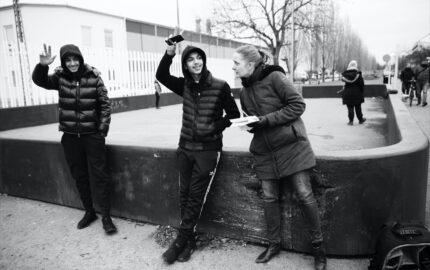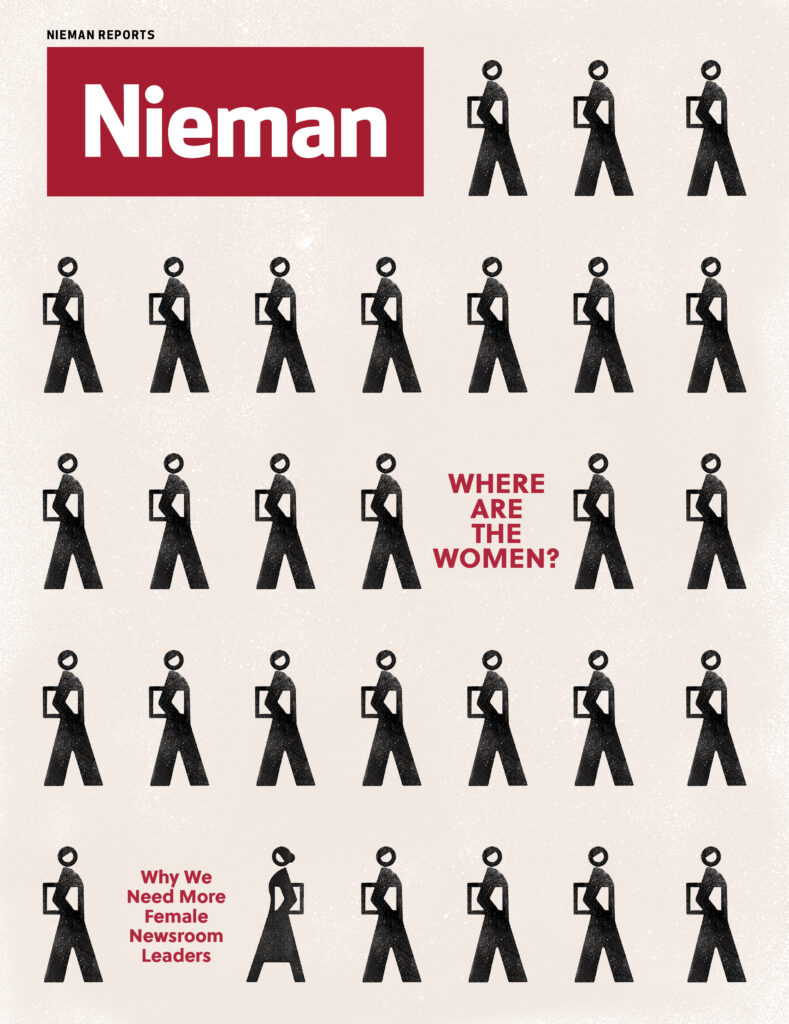
Where Are the Women?
Despite making up half the population and receiving the majority of communication degrees, women currently lead only three of the nation’s top 25 newspapers. What’s lost when women aren’t leading? What can be done to increase their ranks at the top?
Over the past year, Holly Williams, NF ’08, a correspondent for CBS News, has covered conflicts in Iraq and Ukraine. Earlier this summer she made her first trip to Gaza:
On my eighth morning in Gaza, I woke up to find the hotel swaying on its foundation. And then came another roar, an earth-shattering thud, and more rocking as the shock waves hit the building. The Israelis were having another go at taking out the rocket launchers hidden somewhere a few hundred yards south of where we were staying.
They’d been at it for a week, but we still regularly heard the scream of rockets overhead, which meant that either the launchers were impregnable or easily replaced, we never knew which. It seemed a perfect metaphor for a conflict in which both sides promise that violence will deliver results, but all it ever does is produce more bloodshed.
During the daytime the Israeli airstrikes would throw up a blast of smoke and dirt. At night, for a few seconds, the entire area was lit a sickening shade of orange. And we watched it all from our balconies with immunity, because our hotel was safe—the pleasant Israeli officer had told us so as he waved us across the border.
Not so the residents of Gaza, who go to sleep at night knowing that the call from the Israeli military might come at anytime: get out now, we’re about to destroy your house, or the neighbor’s house, or the mosque next door. Imagine the panicked scramble for children and the elderly—shaking them awake, dragging them out the door and away from where a missile will soon obliterate your home and all your belongings. Bad enough, except sometimes there is no mad dash.
Kefah was 9 years old when she was killed by an airstrike, along with most of her family. At the funeral, her two older brothers were buried wrapped in the black flag of Islamic Jihad, adults who had chosen a violent path, who may have taken lives before losing their own. Kefah’s body was shrouded in white, collateral damage in a fight she couldn’t possibly understand.
And then there was Hamdan, still in diapers when we found him in a sweltering hospital ward with a broken leg and lacerated arm. As Hamdan whimpered, his father, Mohammed, swore the family had nothing to do with Hamas. Who knew if it was true?
Like any parent, when I saw Hamdan all I could think of was my own child, just shy of her fourth birthday. My daughter’s all-consuming concern is whether she’ll get a costume like Elsa’s, the vaguely feminist star of the latest Disney film. When I Skype her from my hotel she wants to know if I’ve found one yet, reminding me how important it is.
I desperately want Hamdan to have worries like my daughter’s. I want him to be fighting over toys, not caught in the crossfire. Instead, he’s being taught to hate, and I know there’s a good chance he too will choose violence, and end his life early, wrapped in a black flag.
On my eighth morning in Gaza, I woke up to find the hotel swaying on its foundation. And then came another roar, an earth-shattering thud, and more rocking as the shock waves hit the building. The Israelis were having another go at taking out the rocket launchers hidden somewhere a few hundred yards south of where we were staying.
They’d been at it for a week, but we still regularly heard the scream of rockets overhead, which meant that either the launchers were impregnable or easily replaced, we never knew which. It seemed a perfect metaphor for a conflict in which both sides promise that violence will deliver results, but all it ever does is produce more bloodshed.
During the daytime the Israeli airstrikes would throw up a blast of smoke and dirt. At night, for a few seconds, the entire area was lit a sickening shade of orange. And we watched it all from our balconies with immunity, because our hotel was safe—the pleasant Israeli officer had told us so as he waved us across the border.
Not so the residents of Gaza, who go to sleep at night knowing that the call from the Israeli military might come at anytime: get out now, we’re about to destroy your house, or the neighbor’s house, or the mosque next door. Imagine the panicked scramble for children and the elderly—shaking them awake, dragging them out the door and away from where a missile will soon obliterate your home and all your belongings. Bad enough, except sometimes there is no mad dash.
Kefah was 9 years old when she was killed by an airstrike, along with most of her family. At the funeral, her two older brothers were buried wrapped in the black flag of Islamic Jihad, adults who had chosen a violent path, who may have taken lives before losing their own. Kefah’s body was shrouded in white, collateral damage in a fight she couldn’t possibly understand.
And then there was Hamdan, still in diapers when we found him in a sweltering hospital ward with a broken leg and lacerated arm. As Hamdan whimpered, his father, Mohammed, swore the family had nothing to do with Hamas. Who knew if it was true?
Like any parent, when I saw Hamdan all I could think of was my own child, just shy of her fourth birthday. My daughter’s all-consuming concern is whether she’ll get a costume like Elsa’s, the vaguely feminist star of the latest Disney film. When I Skype her from my hotel she wants to know if I’ve found one yet, reminding me how important it is.
I desperately want Hamdan to have worries like my daughter’s. I want him to be fighting over toys, not caught in the crossfire. Instead, he’s being taught to hate, and I know there’s a good chance he too will choose violence, and end his life early, wrapped in a black flag.
